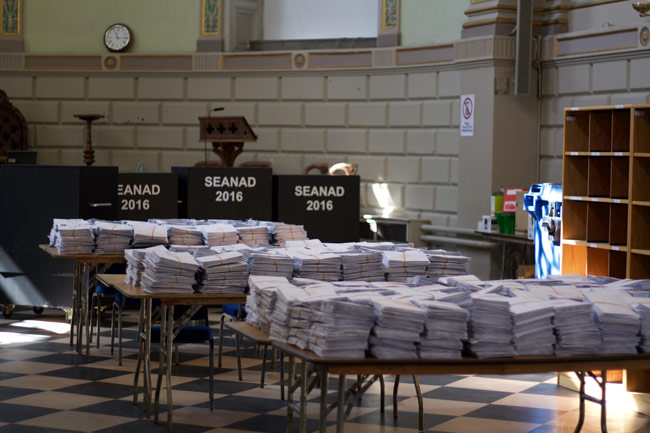The College’s Senators are at odds over proposals that would see the amalgamation of the Trinity and National University of Ireland (NUI) panels in the Seanad.
A Seanad reform report is set to recommend the creation of one six-seat university panel that would be elected by graduates of all higher education institutions, getting rid of the Trinity panel, the Sunday Business Post reported.
In an email statement to The University Times, Senator Lynn Ruane said that she would support the proposed reform: “Trinity is not losing anything under these proposals.”
“Every graduate currently able to cast a vote in a Trinity Seanad election will retain that right under these proposals; just as part of a new, more broadly enfranchised higher education constituency where the incredibly rich tradition of Trinity senators can be maintained and continue to make outstanding contributions to the Oireachtas and Irish public life”, she said.
Speaking to The University Times, Senator David Norris said that he thought the proposals were “complete nonsense”.
He said that while he thought it was unlikely that all the proposed reforms would be implemented by the government, “the danger is they might in terms of the Trinity constituency because that’s the easy target to pick. But certainly, I will be doing everything I possibly can to prostrate it”.
In an email statement to The University Times, Senator Ivana Bacik said that she was “disappointed that the proposal to recommend three two-seat University panels instead of moving to one six seat panel for Seanad elections was rejected”.
She went on: “I think it will be very difficult logistically to operate one giant six seat panel, and I intend putting in a minority report to the Reform committee to make that point.”
In a 1979 constitutional referendum, 92 per cent voted to allow changes to the election procedure of the six seats in the universities’ constituencies. Ruane said that the new proposals “will give effect to the overwhelming mandate” of the referendum.
Ruane stressed that the changes to the university constituencies were not the only Seanad reforms proposed. “These are radical proposals”, she said, “where the Seanad will for the first time under our Constitution be opened up to the people and the university constituencies will work as they were intended in the 1979 referendum”.
Ruane said that with the review of the Seanad aiming to “broaden the franchise and give the Irish people a voice in their upper house, it just wouldn’t be fair for the university constituencies to be left completely unreformed”.
Norris, however, said that “the idea of one gigantic six-seater constituency with well over one million voters either intentionally or unintentionally will have the effect of destroying the independent voice of the universities because it would be impossible for an individual to campaign with such an enormous constituency”.
Norris has concerns that a new large constituency would “leave it wide open for the political parties to take over”.
“Someone just starting off – they’d get nowhere, absolutely nowhere”, he said.
Norris said that other areas of reform in the Seanad should be looked at – particularly the 11 Senators nominated by the Taoiseach: “I mean, why are they reforming, or ‘reforming’ in inverted commas, the only democratic constituency in the entire Senate?”
Asked if he thought the current system of senator elections was elitist, Norris said: “Of course it’s elitist. What’s wrong with having the best? I think we should have the best.”
In an email statement to The University Times, former Senator Sean Barrett said he opposed the merger of the two university constituencies and that the “Dublin University seats have been a target for some time”.
“By sheer numbers it accomplishes the abolition of the TCD representation which has served the country well. I would retain the present two university constituencies and add one to represent the new institutions”, he said. Barrett said that “no constituency defended the Senate more than TCD when abolition was proposed in 2013”.
Barrett also pointed to other areas of the Seanad that he thinks should be prioritised for reform: “If it is seriously intended to reform the Seanad the attention should focus on the Taoiseach’s power to nominate 11 members and the election of 43 members by local authorities. The first constituency has only a single member, the Taoiseach and the second has some 1200 local councillors. The TCD constituency has some 70,000 voters.”
In February, Taoiseach Leo Varadkar proposed that an Oireachtas special committee be set up to develop proposals to legislate for the implementation of a 2015 report from the working group on Seanad reform. The report recommended that university graduates choose between voting in the university constituencies or one of the other vocational constituencies, which would also be directly elected.
Varadkar said: “The university panels should be retained as recommended. They have served us well, although they should be reformed to implement the result of the 1979 referendum and open up the franchise to graduates of all higher level institutions of education.”
A committee made up of TDs and Senators has been looking into the implementation of the 2015 report and will send a final report to Varadkar this week. Minister for Transport Shane Ross, a former Trinity senator, sits on the committee.







